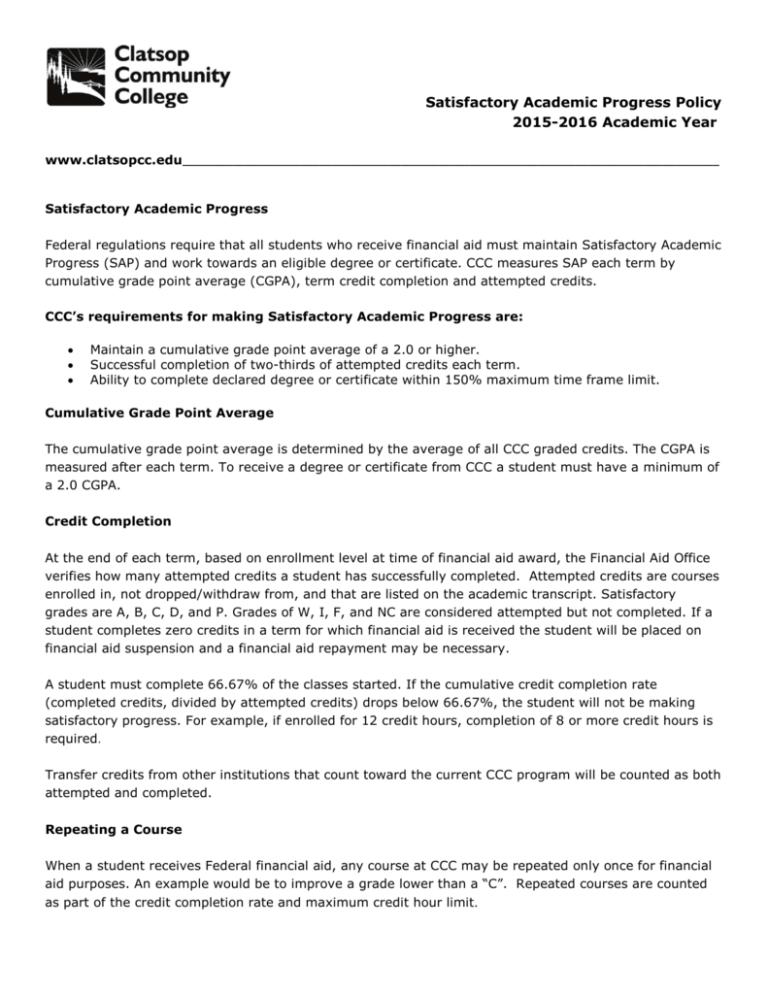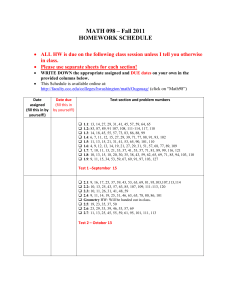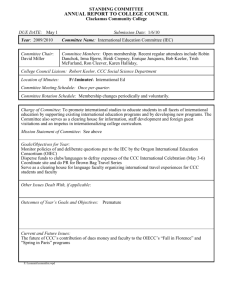Satisfactory Academic Progress Policy 2015
advertisement

Satisfactory Academic Progress Policy 2015-2016 Academic Year www.clatsopcc.edu______________________________________________________________________________________ Satisfactory Academic Progress Federal regulations require that all students who receive financial aid must maintain Satisfactory Academic Progress (SAP) and work towards an eligible degree or certificate. CCC measures SAP each term by cumulative grade point average (CGPA), term credit completion and attempted credits. CCC’s requirements for making Satisfactory Academic Progress are: • • • Maintain a cumulative grade point average of a 2.0 or higher. Successful completion of two-thirds of attempted credits each term. Ability to complete declared degree or certificate within 150% maximum time frame limit. Cumulative Grade Point Average The cumulative grade point average is determined by the average of all CCC graded credits. The CGPA is measured after each term. To receive a degree or certificate from CCC a student must have a minimum of a 2.0 CGPA. Credit Completion At the end of each term, based on enrollment level at time of financial aid award, the Financial Aid Office verifies how many attempted credits a student has successfully completed. Attempted credits are courses enrolled in, not dropped/withdraw from, and that are listed on the academic transcript. Satisfactory grades are A, B, C, D, and P. Grades of W, I, F, and NC are considered attempted but not completed. If a student completes zero credits in a term for which financial aid is received the student will be placed on financial aid suspension and a financial aid repayment may be necessary. A student must complete 66.67% of the classes started. If the cumulative credit completion rate (completed credits, divided by attempted credits) drops below 66.67%, the student will not be making satisfactory progress. For example, if enrolled for 12 credit hours, completion of 8 or more credit hours is required. Transfer credits from other institutions that count toward the current CCC program will be counted as both attempted and completed. Repeating a Course When a student receives Federal financial aid, any course at CCC may be repeated only once for financial aid purposes. An example would be to improve a grade lower than a “C”. Repeated courses are counted as part of the credit completion rate and maximum credit hour limit. 150% Maximum Credit Limit The maximum number of credits students may attempt cannot exceed 150% of the credits required to complete a CCC certificate or degree program. This includes all credits accepted for transfer to CCC from other institutions and all credits attempted at CCC. CCC Associate degree programs require approximately 90 credits and have a maximum credit limit of 135 (150%). CCC Certificate programs require between 45-61 credits and have a maximum credit limit of 150% of the specific certificate program. Students will be notified for failure to maintain SAP or reach 150% of the published length of the certificate or degree program. If a student is disqualified due to CGPA or credit completion or unable to complete a certificate or degree within the maximum credit limit and feels they may have extenuating circumstances, see the section on Financial Aid Reinstatement. What are CCC’s Financial Aid Satisfactory Academic Progress Statuses? Financial Aid Good Standing Student has a cumulative GPA of 2.0 or higher, student is completing two-thirds (66.67%) of all attempted credits each term, and student is able to graduate within 150% maximum time frame limit. Financial Aid Warning Student’s cumulative GPA dropped below a 2.0, and/or student did not complete two-thirds (66.67%) of all attempted credits in a term, and student is able to graduate within 150% maximum time frame limit. A student is able to receive financial aid while on financial aid warning status, but must meet SAP standards during that term of enrollment to remain eligible for subsequent financial aid. Financial Aid Suspension Student did not meet SAP standards while in Financial Aid Warning or Financial Aid Probation status, or it is determined that the student will not be able to graduate within 150% maximum time frame limit, or a student in Financial Aid Academic Plan status fails to follow the plan. In addition a student will be placed on Financial Aid Suspension if they did not earn any credits for a term they received financial aid. Student is not eligible to receive financial aid while on Financial Aid Suspension. Financial Aid Probation This status is only granted upon the approval of a Financial Aid SAP Appeal. A student may receive financial aid for one term but must meet SAP standards by the end of that term to remain eligible for subsequent financial aid. If deemed necessary to make SAP, a student may be placed on an academic plan. This status is only granted upon the approval of a Financial Aid SAP Appeal with the condition the student follows an academic plan. The student is eligible to receive financial aid as long as the student continues to follow that academic plan. Reinstatement of Financial Aid Eligibility and Appeal Process Financial aid eligibility may be reinstated when the student raises his/her CGPA to a 2.0 and has achieved a cumulative completion rate of two-thirds (66.67%) of all credit hours attempted. Reinstatement of financial aid eligibility may also occur upon approval of a Satisfactory Academic Progress Appeal. Satisfactory Academic Progress Appeal Process A student may request consideration for reinstatement of financial aid eligibility through a formal appeal process by completing the Satisfactory Academic Progress Appeal form with appropriate documentation. An appeal must be received and approved prior to or during a term for which aid is being requested. Aid will not be awarded retroactively for a prior term in which financial aid eligibility was suspended or during which satisfactory progress was not made. A student may appeal if the reason for failure to meet the minimum satisfactory academic progress standards was the result of extenuating circumstances and if the situation that caused the poor performance has been resolved. Documentation of extenuating circumstances may be required. Extenuating circumstances are; significant and usually documentable, are unforeseen and beyond a student’s control, occurred during the term and had a direct impact on a student’s ability to successfully complete the term. A student cannot appeal more than once for a specific extenuating circumstance and how that circumstance was resolved. The Financial Aid Issues Committee and/or Financial Aid Director will review petitions and notify the student of the decision in writing. If approved, the student will be in Financial Aid Probation Status and must complete the conditions outlined in the petition decision. If denied a student will need to successfully complete the deficiency whether it was credit completion and/or CGPA to be considered for all types of financial aid. Appeals may result in any one of the following actions: • • • Reinstatement on probation Reinstatement on an academic plan where the student will be held to specific requirements Denial of reinstatement Petition for Extension of Credit Limit, Exceed 150% of Maximum Credit Limit If a student is denied eligibility for financial aid due to exceeding the maximum credit limit for a CCC program and feels they have extenuating circumstances, they have the right to petition. If a Petition for Extension of Credit Limit is approved, the student must enroll only in required courses and successfully complete 66.67% attempted credits, otherwise the Extension is void. Students will be sent a Credit Limit Advising Form as they progress towards the completion of a program. This will require submitting specific information that is needed to perform an accurate calculation of the 150% maximum timeframe. If at any point, it is determined a student cannot graduate within this time frame, regulations stipulate ineligibility for further aid at CCC. Academic Advising CCC encourages you to seek academic advising if you need information on how to complete your program of study. If you do not have an advisor, or if you do not know who your advisor is, please stop by the Student Services Center for this information. Petitioning for reinstatement if disqualified due to credits or CGPA, or petitioning for an Extension of Credit Limit is a very serious thing. Once done, students are responsible for following the plan developed through the appeal process. Failure to follow the requirements of the appeal decision will result in suspension of financial aid eligibility. Appeal decisions are final and no further appeals concerning the same situation will be considered. 1/15







